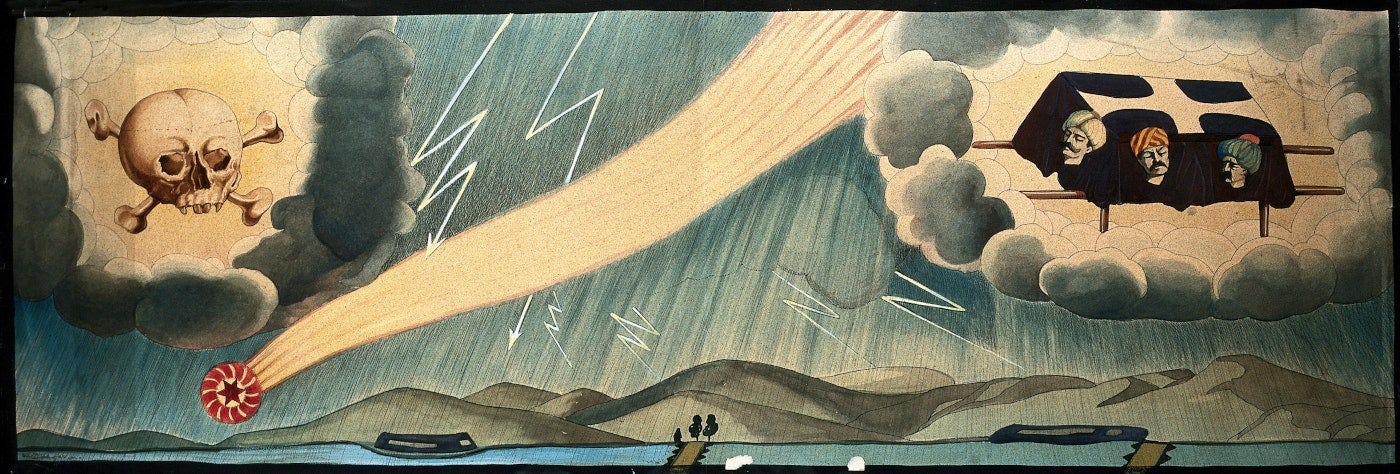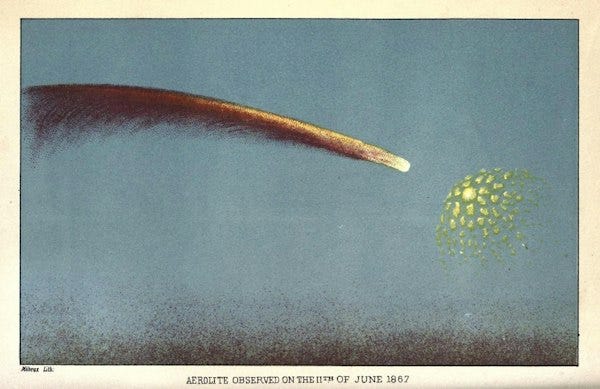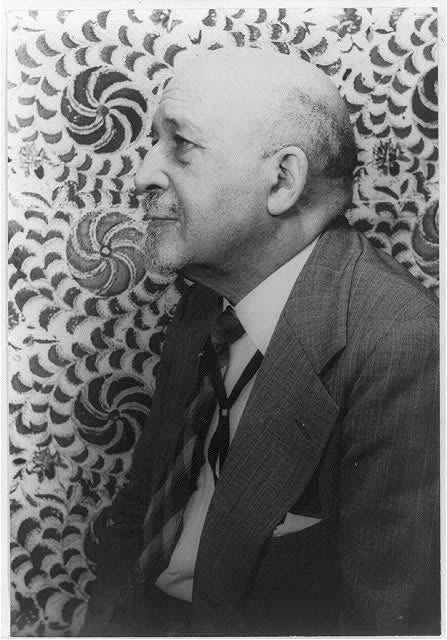A riveting sci-fi story
This gripping 1909 piece by W.E.B. Du Bois imagines the apocalypse...with a surprising twist
W.E.B. Du Bois, “The Comet”
He stood a moment on the steps of the bank, watching the human river that swirled down Broadway. Few noticed him. Few ever noticed him save in a way that stung. He was outside the world—"nothing!" as he said bitterly. Bits of the words of the walkers came to him.

"The comet?"
"The comet——"
Everybody was talking of it. Even the president, as he entered, smiled patronizingly at him, and asked:
"Well, Jim, are you scared?"
"No," said the messenger shortly.
"I thought we'd journeyed through the comet's tail once," broke in the junior clerk affably.
"Oh, that was Halley's," said the president; "this is a new comet, quite a stranger, they say—wonderful, wonderful! I saw it last night. Oh, by the way, Jim," turning again to the messenger, "I want you to go down into the lower vaults today."
The messenger followed the president silently. Of course, they wanted him to go down to the lower vaults. It was too dangerous for more valuable men. He smiled grimly and listened.
"Everything of value has been moved out since the water began to seep in," said the president; "but we miss two volumes of old records. Suppose you nose around down there,—it isn't very pleasant, I suppose."
"Not very," said the messenger, as he walked out.
"Well, Jim, the tail of the new comet hits us at noon this time," said the vault clerk, as he passed over the keys; but the messenger passed silently down the stairs. Down he went beneath Broadway, where the dim light filtered through the feet of hurrying men; down to the dark basement beneath; down into the blackness and silence beneath that lowest cavern. Here with his dark lantern he groped in the bowels of the earth, under the world.
He drew a long breath as he threw back the last great iron door and stepped into the fetid slime within. Here at last was peace, and he groped moodily forward. A great rat leaped past him and cobwebs crept across his face. He felt carefully around the room, shelf by shelf, on the muddied floor, and in crevice and corner. Nothing. Then he went back to the far end, where somehow the wall felt different. He sounded and pushed and pried. Nothing. He started away. Then something brought him back. He was sounding and working again when suddenly the whole black wall swung as on mighty hinges, and blackness yawned beyond. He peered in; it was evidently a secret vault—some hiding place of the old bank unknown in newer times. He entered hesitatingly. It was a long, narrow room with shelves, and at the far end, an old iron chest. On a high shelf lay the two missing volumes of records, and others. He put them carefully aside and stepped to the chest. It was old, strong, and rusty. He looked at the vast and old-fashioned lock and flashed his light on the hinges. They were deeply incrusted with rust. Looking about, he found a bit of iron and began to pry. The rust had eaten a hundred years, and it had gone deep. Slowly, wearily, the old lid lifted, and with a last, low groan lay bare its treasure—and he saw the dull sheen of gold!
"Boom!"

A low, grinding, reverberating crash struck upon his ear. He started up and looked about. All was black and still. He groped for his light and swung it about him. Then he knew! The great stone door had swung to. He forgot the gold and looked death squarely in the face. Then with a sigh he went methodically to work. The cold sweat stood on his forehead; but he searched, pounded, pushed, and worked until after what seemed endless hours his hand struck a cold bit of metal and the great door swung again harshly on its hinges, and then, striking against something soft and heavy, stopped. He had just room to squeeze through. There lay the body of the vault clerk, cold and stiff. He stared at it, and then felt sick and nauseated. The air seemed unaccountably foul, with a strong, peculiar odor. He stepped forward, clutched at the air, and fell fainting across the corpse.
He awoke with a sense of horror, leaped from the body, and groped up the stairs, calling to the guard. The watchman sat as if asleep, with the gate swinging free. With one glance at him the messenger hurried up to the sub-vault. In vain he called to the guards. His voice echoed and re-echoed weirdly. Up into the great basement he rushed. Here another guard lay prostrate on his face, cold and still. A fear arose in the messenger's heart. He dashed up to the cellar floor, up into the bank. The stillness of death lay everywhere and everywhere bowed, bent, and stretched the silent forms of men. The messenger paused and glanced about. He was not a man easily moved; but the sight was appalling! "Robbery and murder," he whispered slowly to himself as he saw the twisted, oozing mouth of the president where he lay half-buried on his desk. Then a new thought seized him: If they found him here alone—with all this money and all these dead men—what would his life be worth? He glanced about, tiptoed cautiously to a side door, and again looked behind. Quietly he turned the latch and stepped out into Wall Street.
How silent the street was! Not a soul was stirring, and yet it was high-noon—Wall Street? Broadway? He glanced almost wildly up and down, then across the street, and as he looked, a sickening horror froze in his limbs. With a choking cry of utter fright he lunged, leaned giddily against the cold building, and stared helplessly at the sight.
In the great stone doorway a hundred men and women and children lay crushed and twisted and jammed, forced into that great, gaping doorway like refuse in a can—as if in one wild, frantic rush to safety, they had rushed and ground themselves to death. Slowly the messenger crept along the walls, wetting his parched mouth and trying to comprehend, stilling the tremor in his limbs and the rising terror in his heart. He met a business man, silk-hatted and frock-coated, who had crept, too, along that smooth wall and stood now stone dead with wonder written on his lips. The messenger turned his eyes hastily away and sought the curb. A woman leaned wearily against the signpost, her head bowed motionless on her lace and silken bosom. Before her stood a street car, silent, and within—but the messenger but glanced and hurried on. A grimy newsboy sat in the gutter with the "last edition" in his uplifted hand: "Danger!" screamed its black headlines. "Warnings wired around the world. The Comet's tail sweeps past us at noon. Deadly gases expected. Close doors and windows. Seek the cellar." The messenger read and staggered on. Far out from a window above, a girl lay with gasping face and sleevelets on her arms. On a store step sat a little, sweet-faced girl looking upward toward the skies, and in the carriage by her lay—but the messenger looked no longer. The cords gave way—the terror burst in his veins, and with one great, gasping cry he sprang desperately forward and ran,—ran as only the frightened run, shrieking and fighting the air until with one last wail of pain he sank on the grass of Madison Square and lay prone and still.
When he rose, he gave no glance at the still and silent forms on the benches, but, going to a fountain, bathed his face; then hiding himself in a corner away from the drama of death, he quietly gripped himself and thought the thing through: The comet had swept the earth and this was the end. Was everybody dead? He must search and see.
He knew that he must steady himself and keep calm, or he would go insane. First he must go to a restaurant. He walked up Fifth Avenue to a famous hostelry and entered its gorgeous, ghost-haunted halls. He beat back the nausea, and, seizing a tray from dead hands, hurried into the street and ate ravenously, hiding to keep out the sights.
"Yesterday, they would not have served me," he whispered, as he forced the food down.
Then he started up the street,—looking, peering, telephoning, ringing alarms; silent, silent all. Was nobody—nobody—he dared not think the thought and hurried on.
Suddenly he stopped still. He had forgotten. My God! How could he have forgotten? He must rush to the subway—then he almost laughed. No—a car; if he could find a Ford. He saw one. Gently he lifted off its burden, and took his place on the seat. He tested the throttle. There was gas. He glided off, shivering, and drove up the street. Everywhere stood, leaned, lounged, and lay the dead, in grim and awful silence. On he ran past an automobile, wrecked and overturned; past another, filled with a gay party whose smiles yet lingered on their death-struck lips; on past crowds and groups of cars, pausing by dead policemen; at 42nd Street he had to detour to Park Avenue to avoid the dead congestion. He came back on Fifth Avenue at 57th and flew past the Plaza and by the park with its hushed babies and silent throng, until as he was rushing past 72nd Street he heard a sharp cry, and saw a living form leaning wildly out an upper window. He gasped. The human voice sounded in his ears like the voice of God.
"Hello—hello—help, in God's name!" wailed the woman. "There's a dead girl in here and a man and—and see yonder dead men lying in the street and dead horses—for the love of God go and bring the officers——" And the words trailed off into hysterical tears.
He wheeled the car in a sudden circle, running over the still body of a child and leaping on the curb. Then he rushed up the steps and tried the door and rang violently. There was a long pause, but at last the heavy door swung back. They stared a moment in silence. She had not noticed before that he was a Negro. He had not thought of her as white. She was a woman of perhaps twenty-five—rarely beautiful and richly gowned, with darkly-golden hair, and jewels. Yesterday, he thought with bitterness, she would scarcely have looked at him twice. He would have been dirt beneath her silken feet. She stared at him. Of all the sorts of men she had pictured as coming to her rescue she had not dreamed of one like him. Not that he was not human, but he dwelt in a world so far from hers, so infinitely far, that he seldom even entered her thought. Yet as she looked at him curiously he seemed quite commonplace and usual. He was a tall, dark workingman of the better class, with a sensitive face trained to stolidity and a poor man's clothes and hands. His face was soft and slow and his manner at once cold and nervous, like fires long banked, but not out.
So a moment each paused and gauged the other; then the thought of the dead world without rushed in and they started toward each other.
What we love about this story…
The story almost seems to be a thought experiment — what would happen to racism at the end of the world? If a comet struck the Earth, leaving only a few survivors, would people look past their prejudices? Or would these prejudices only harden?
Du Bois had long been interested in the work of HG Wells, and it’s possible to read “The Comet” as a rejoinder to Wells’s famous science fiction of the late nineteenth century, like The Time Machine (1895) and War of the Worlds (1897). Like Wells, Du Bois believed in the political value of literature and often wrote in the hopes of inspiring social change.
Even though the story hinges on the race of Jim, the main character, Du Bois delays clearly identifying his race until after the comet has struck. Perhaps this technique asks readers to think about the way they read, and the unconscious assumptions they bring to the page. On the other hand, the race of Jim may have been less of a mystery to the original readers of the story, which was published as the final piece in a collection of Du Bois’s writings on race, Darkwater: Voices from Within the Veil (1920).
About the Author…
W.E.B. Du Bois (1868-1963) dedicated his life to what he called “the problem of the twentieth century […] the problem of the color-line,—the relation of the darker to the lighter races of men in Asia and Africa, in America and the islands of the sea.”

He earned the first doctoral degree awarded to an African-American from Harvard University in 1895 and is well known for publications like the lyrical and incisive The Souls of Black Folk (read selected excerpts from it at our sister project, Ten Minute Book Club) and its 1920 follow-up Darkwater: Voices from Within the Veil, as well as for his editorship of the official magazine of the National Association for the Advancement of Colored People (NAACP), The Crisis. His writing was significant across disciplines, ranging from his sociological study The Philadelphia Negro: A Social Study (1899) to his history of the era immediately following the American Civil War, Black Reconstruction in America (1935); he even wrote plays, short stories, and literary epics in his nearly unending quest to end racism both in America and the world at large.
To Read Alongside…
Two early end-of-the-world catastrophe novels are Mary Shelley’s The Last Man (1826), in which a pandemic has wiped out everyone on earth except a man and his dog; and M.P. Shiel’s The Purple Cloud (1901), in which the mysterious title object obliterates nearly all of humankind.
Other authors who like Du Bois sought to rewrite Wells’s brand of science fiction include E.M. Forster, whose prescient short story “The Machine Stops” (1909) questioned whether technology could create a utopia. But the humans in the story become so acclimatized to living in "the machine” that they die if they leave it, as their bodies can no longer tolerate the earth’s atmosphere.
Afro-Futurist writers such as Octavia E. Butler (1947-2006) would also use the conventions of science fiction to bring light to the prejudice and injustice. In one of her best-known works, Kindred (1979), on the eve of the United States’s 1976 bicentenary a woman time travels to meet her ancestor: an enslaved woman living in 1815.
Du Bois’s short story also reminds us of Toni Morrison’s “Recicatif” (1983), which is often considered a literary experiment as Morrison removed the identifying racial codes of her characters: two roommates in a girls’ shelter, one black, the other white—but we are not told which is which.
John Wyndham’s The Day of the Triffids (1951) bears uncanny resemblances to both Wells’s War of the Worlds and Du Bois’s “The Comet,” as it too features astronomical events causing widespread destruction. In Triffids, a meteor shower blinds the population and spawns giant, malignant, people-killing plants. As in Du Bois’s story, the protagonist just happened to evade the blight. Is survival a blessing or a curse? These works don’t always tell us, leaving the answer to our imaginations.
Suggest a LitHit!
Tell us your own favourites from literature you've read, and we can feature you as a Guest Curator if you like. Just email us with the following information:
Your full name
The title of the book you're suggesting
The location of the excerpt within the book (e.g., "in the middle of chapter 5"), or the excerpt itself copied into the email or attached to it (in Word)
Why you love it, in just a few sentences
About LitHits
LitHits helps you make time for reading by bringing you unabridged excerpts from brilliant literature that you can read on the go, anytime or any place. Our curators carefully select and frame each excerpt so that you can dive right in. We are more than a book recommendation site: we connect you with a powerful, enduring piece of literature, served directly to your mobile phone, tablet or computer.
Today's guest curator...
Dr Daniel Abdalla is a core member of LitHits and an expert in nineteenth and twentieth-century literature, particularly its relationship to science.
You might also enjoy...
Feedback
We'd love to hear your thoughts on our newsletter:
kshepherdb@yahoo.co.uk
Graphic design by Sara Azmy
All curation content © 2024 LitHits. All rights reserved.

